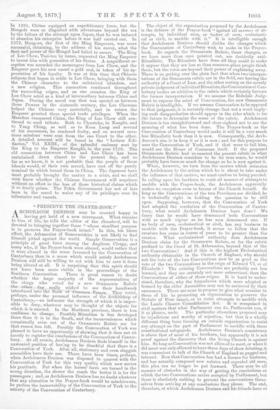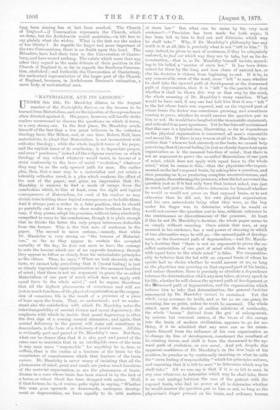"PRESERVE THE PRAYER-BOOK I"
ARCHDEACON DENISON may be counted happy in having got hold of a new movement. What remains to him of life, he tells the editor of the Standard, will be devoted to bringing together those "whose steadfast purpose is to preserve the Prayer-book intact." In this, his latest effort, the Athanasius of Somersetshire is not likely to find himself pitted against the world. Simple Conservatism is a principle of great force among the Anglican Clergy, and many who, if the Prayer-book were altered, would rather that it were altered in the sense favoured by the Convocation of Canterbury than in a sense which would satisfy Archdeacon Denison will still be willing to act with him to save it from being altered at all. It is surprising that this spirit should not have been more visible in the proceedings of the
Southern Convocation. There is great reason to doubt whether the large majority of the representatives of the clergy who voted for a new Ornaments Rubric the other day really wished to see their handiwork introduced into the Book of Common Prayer. They voted, perhaps, under the personal influence of the Archbishop of Canterbury,—an influence the strength of which it is impos- sible to deny, whatever may be thought of the objects for which it is exerted. In the Northern province, there is less readiness to change. Possibly Ritualism is less developed there than it is in the South, and the inconveniences which occasionally arise out of the Ornaments Rubric are for that reason less felt. Possibly the Convocation of York was pleased to have an opportunity of showing that it does not sit merely to register the conclusions of the Convocation of Canter- bury. At all events, Archdeacon Denison finds himself in the unwonted position of hav:ng to be thankful that there is a Convocation of York. After all, stationary and even sluggish assemblies have their use. There have been times, perhaps, when Archdeacon Denison was disposed tia quarrel with the Convocation of York for this very quality which now moves his gratitude. But when the horses' faces are turned in the wrong direction, the slower the coach the better it is for the passengers ; and, as Archdeacon Denison has no doubt whatever that any alteration in the Prayer-book would be mischievous, he prefers the immovability of the Convocation of York to the activity of the Convocation of Canterbury. The object of the organisation proposed by the Archdeacon is the defence of the Prayer-book "against all minuet of at- tempts, by individual men, or bodies of men, ecclesiasti- cal or civil, to meddle with it." It is intelligible enough that Archdeacon Denison should dislike the changes which the Convocation of Canterbury wish to make in the Prayer- book. As regards the Ornaments Rubric, these changes, as we have more than once pointed out, are decidedly anti- Ritualistic. The Ritualists have done all they could to make it appear that they are less so than common-place people think them, but the votes are beyond their power of explaining away. There is no getting over the plain fact that when two interpre- tations of the Ornaments rubric are in the field, one having the authority of a Court of Law, and the other resting on the merely private judgment of individual Ritualists, the Convocation of Can- terbury makes an addition to the rubric which certainly favours the former interpretation. If we assume the Ridsdale Judg- ment to express the mind of Convocation, the new Ornaments Rubric is intelligible. If we assume Convocation to be opposed to that judgment, it is certainly strange that not a word imply- ing such disapprobation should appear in the rider which is for the future to determine the sense of the rubric. Archdeacon Denison is too straightforward and clear-sighted not to see the meaning of what has been done. The Prayer-book as the Convocation of Canterbury would make it will be a very much less Ritualistic book than it is now. Consequently, the Arch- deacon's aim is to keep it as it is now ; and for this purpose he uses the Convocation of York, and if that were to fail him, would use the House of Commons itself. If the proposed Ornaments Rubric had re-enacted the present rubric in what Archdeacon Denison considers to be its true sense, he would probably have been as much for change as he is now against it.
When, however, we turn from the motive which animates the Archdeacon to the action which he is about to take under the influence of that motive, we must confess to being puzzled. In calling upon his brethren to resist all manner of attempts to meddle with the Prayer-book, the Archdeacon apparently makes no exception even in favour of the Church herself. So long as the Convocations of the two Provinces are divided, he is technically right in holding the question to be still open. Supposing, however, that the Convocation of York had adopted the resolution of the Convocation of Canter- bury, what would Archdeacon Denison have done ? We fancy that he would have denounced both Convocations with as much vigour as he has now denounced one. If no body of men, ecclesiastical or civil, has any business to meddle with the Prayer-book, it seems to follow that the creature has come in course of years to be greater than the creator. What ecclesiastical authority does Archdeacon Denison claim for the Ornaments Rubric, or for the rubric prefixed to the Creed of St. Athanasius, beyond that of the two Convocations ? And if this is the highest Ecclesiastical authority obtainable in the Church of England, why should not the vote of the two Convocations now be as good as the vote of the two Convocations in the reign of Edward VI. or of Elizabeth ? The existing Convocations are probably not less learned, and they are certainly not more subservient, than the Convocations of either of those reigns. It is hard to under- stand, therefore, why the formularies which were adopted or framed by the older Assemblies may not be reviewed by their successors. There are none to propose to give what remains to them of life to promoting an orgameation to preserve the Statute of Uses intact, or to resist attempts to meddle with the Lands Clauses Consolidation Act. It is recognised in civil matters that what Parliament can do, Parliament can, if it 80 pleases, undo. The particular alterations proposed may be injudicious and worthy of rejection, but that is a wholly different thing from forming an outside organisation to resist any attempt on the part of Parliament to meddle with these constitutional safeguards. Archdeacon Denison's consistency is above that of most of his brethren, but apparently it is not proof against the discovery that the living Church is against him. So long as Convocation was not allowed to meet, or when it did meet was only allowed to have three days of show debating, it was convenient to talk of the Church of England as gagged and fettered. Now that Convocation has had a licence for business, and has actually composed new rubrics and repealed old ones, this plea can no longer be put forward. There may be all manner of obstacles in the way of getting the conclusions at which the two Convocations arrive accepted by Parliament, but there is absolutely nothing to prevent the convocations them- selves from arriving at any conclusions they please. The end, therefore, at which Archdeacon Denison and his friends have so
long been aiming has at last been reached. The Church of England—if Convocation represents the Church, which we deny, but the Archdeacon would maintain,—is left free to say plainly what she wishes. What is the first use she makes of her liberty I As regards the larger and more important of the two Convocations, there is no doubt upon this head. The Ritualists have had their turn in the Convocation of Canter- bury, and have scored nothing. The rubric which more than any other they regard as the main defence of their position in the Church of England is, so far as regards the Southern Convoca- tion, abolished ; and forthwith the Convocation of Canterbury, the authorised representative of the larger part of the Church of England, becomes, in Archdeacon Denison's estimation, a mere body of ecclesiastical men.



































 Previous page
Previous page